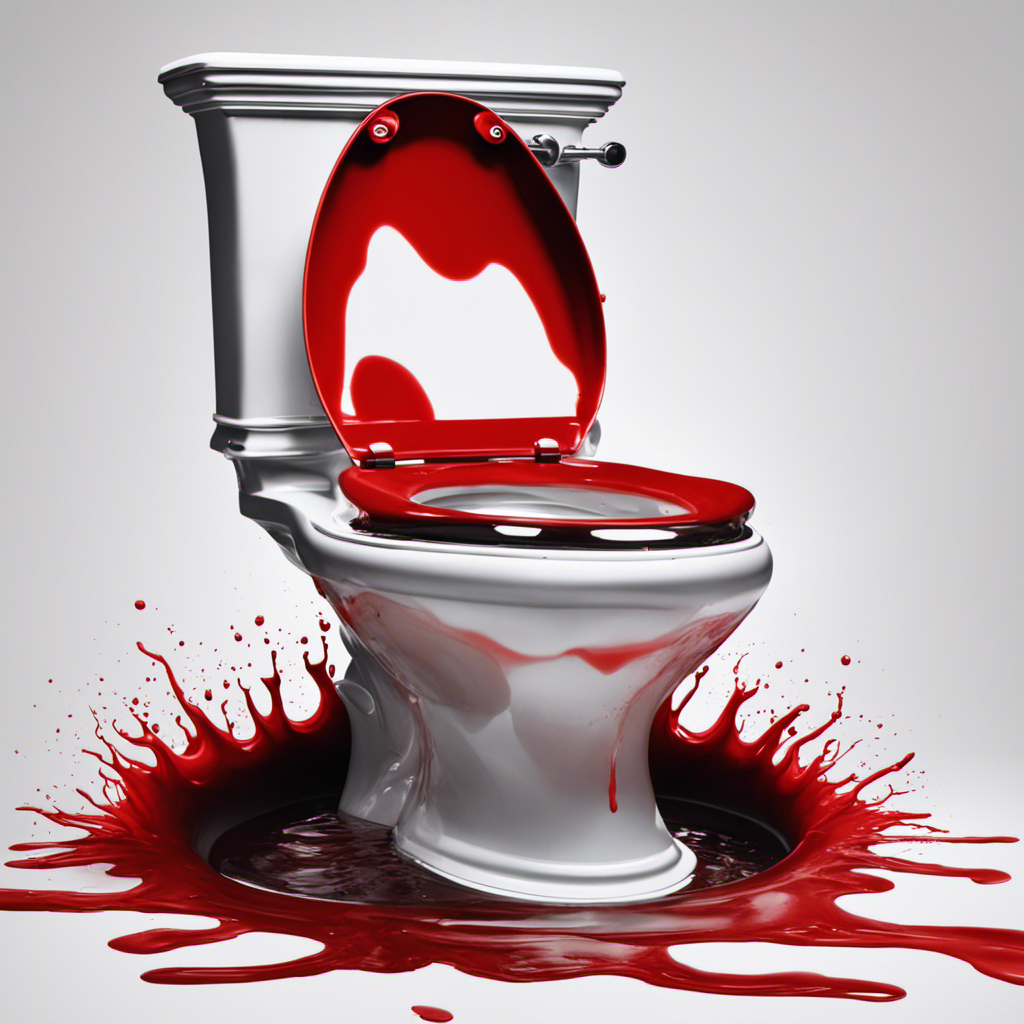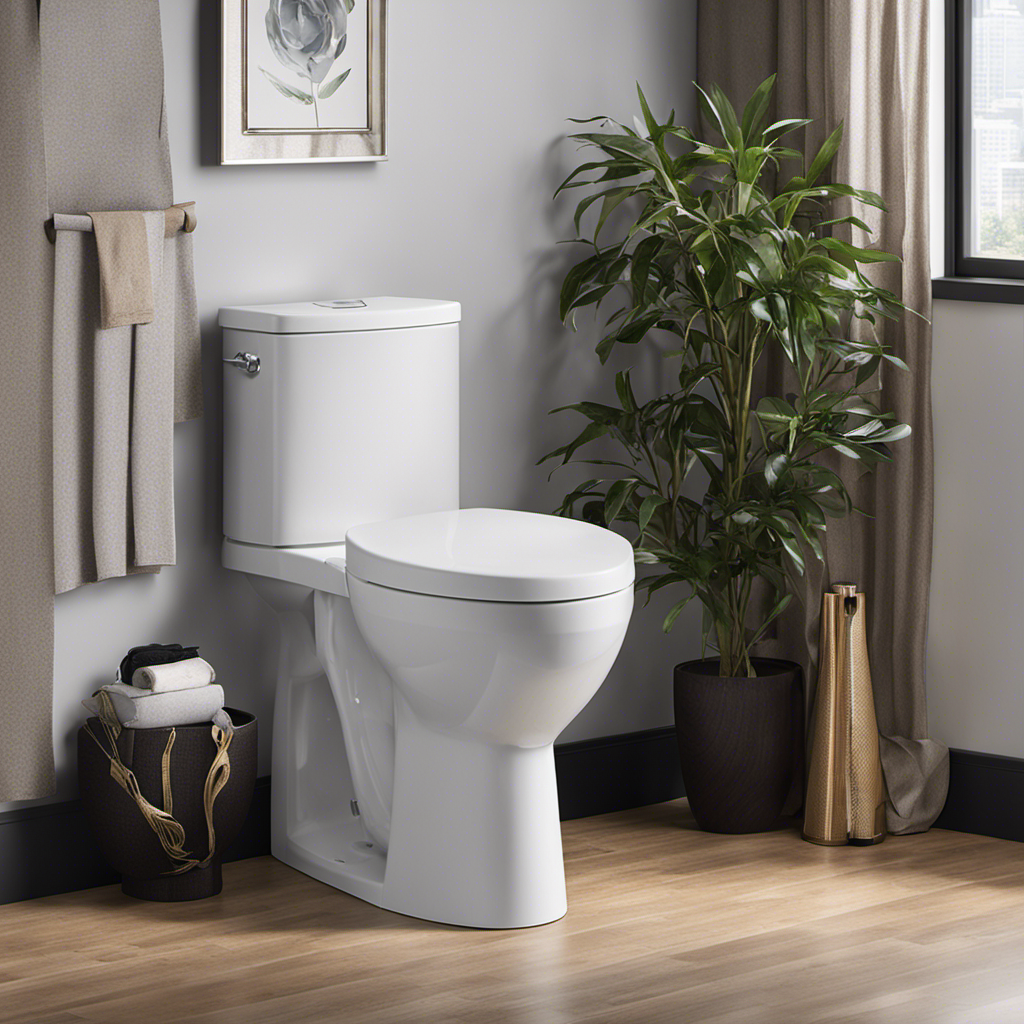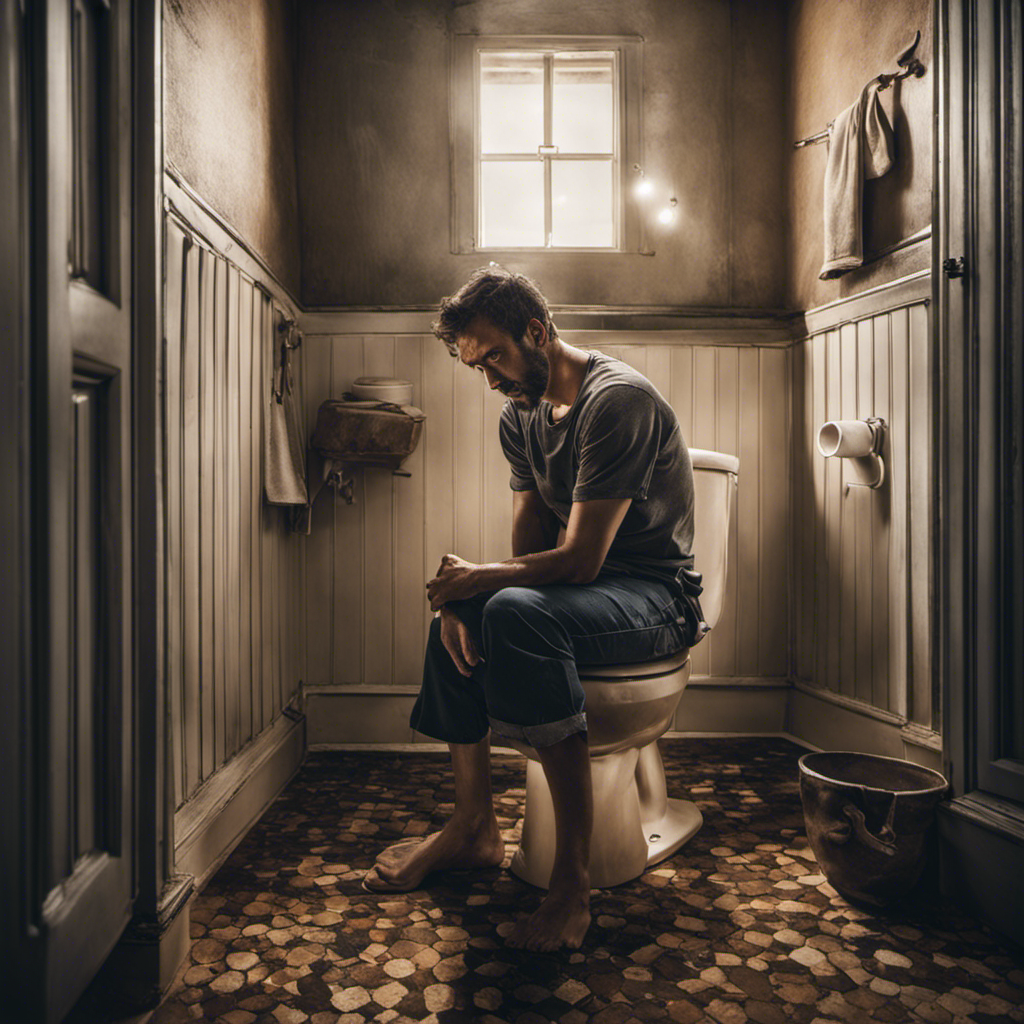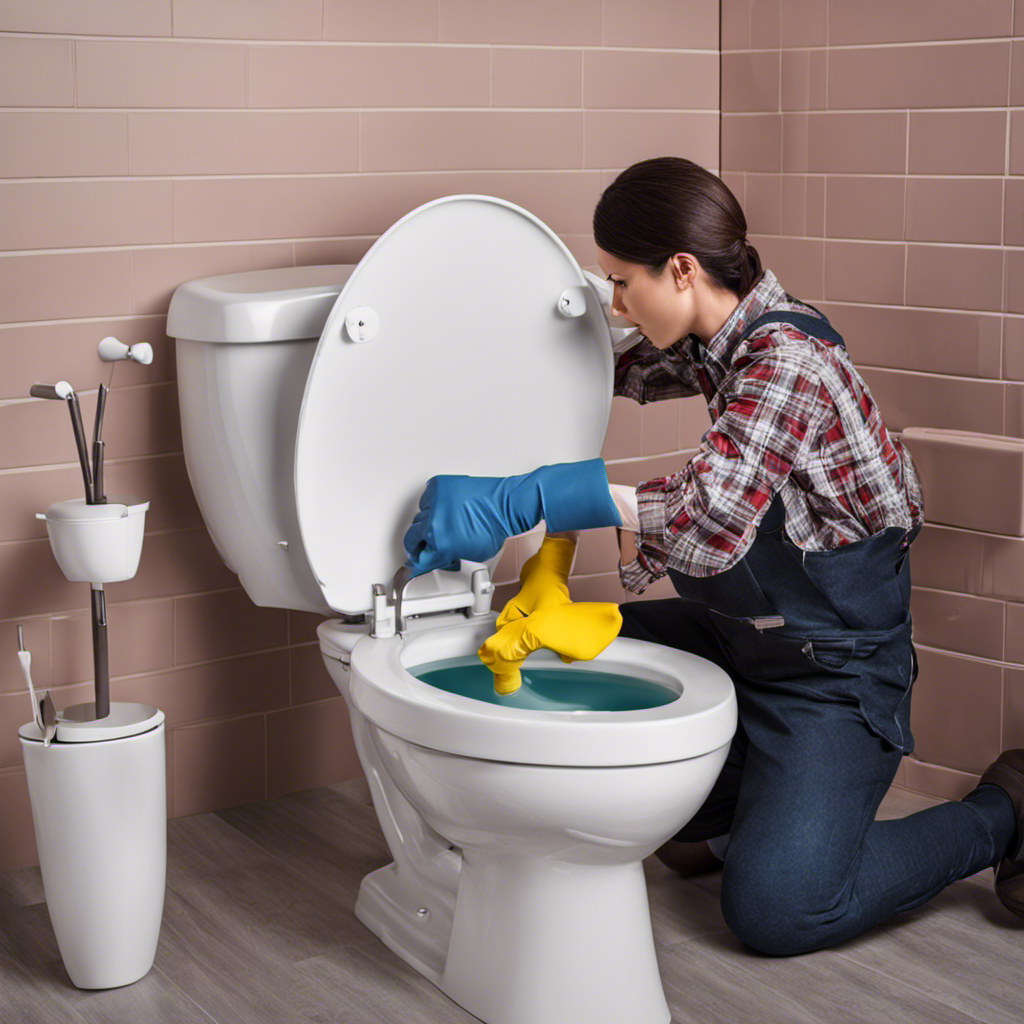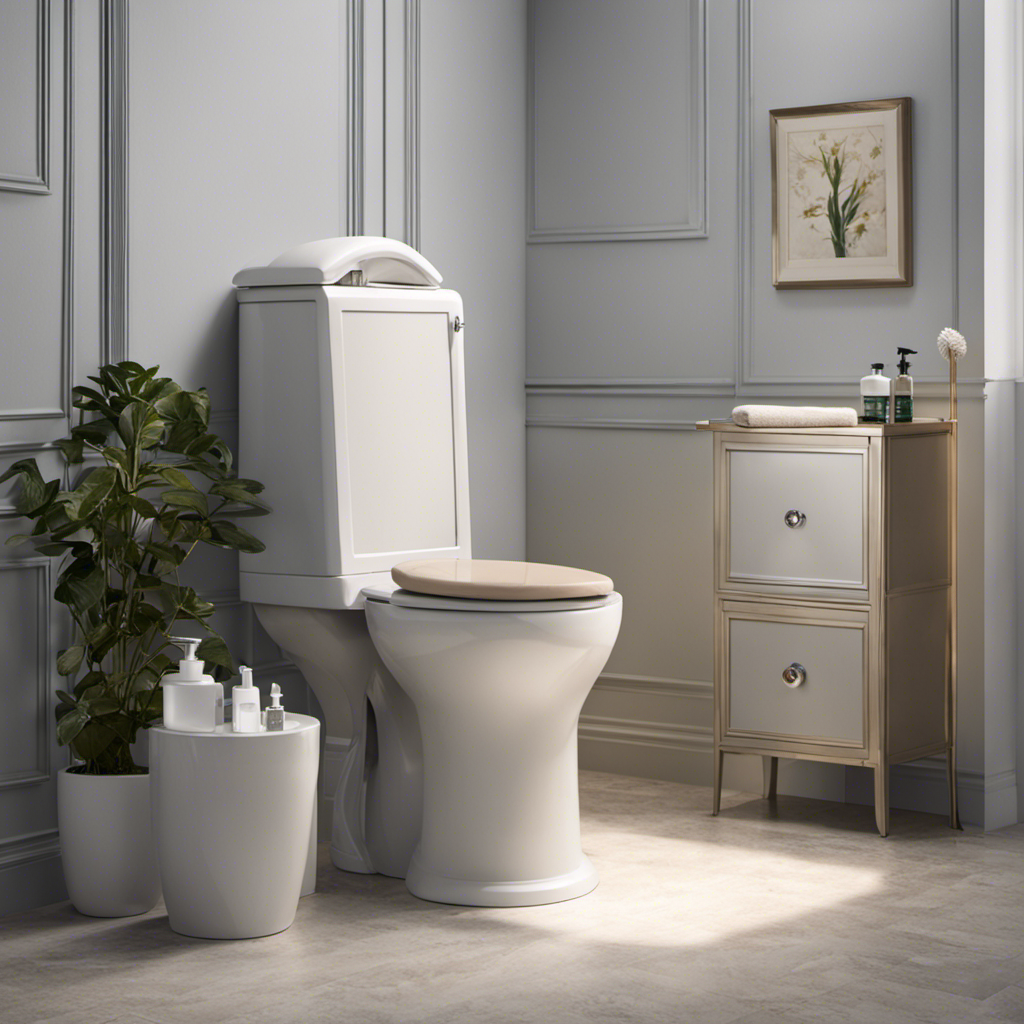As I sit down on the porcelain throne, I am startled to see blood in the toilet when I poop. It’s a sight that raises questions and concerns. What could be causing this alarming phenomenon?
In this article, we will explore the possible causes, symptoms, and treatment options for blood in the toilet when you poop. By shedding light on this topic, we aim to provide you with the knowledge and understanding to address this issue effectively.
Key Takeaways
- Blood in the toilet when pooping can be caused by various factors such as hemorrhoids, anal fissures, inflammatory bowel disease, colorectal cancer, and gastrointestinal infections.
- Not all cases of blood in the toilet indicate a serious condition or cancer, but it is important to seek medical advice for a thorough examination and appropriate treatment.
- Treatment options for blood in the toilet when pooping include dietary changes, topical creams, hemorrhoid banding, medications, and surgical procedures or endoscopic therapies for severe cases or internal hemorrhoids.
- Prevention and lifestyle changes such as increasing fiber intake, staying hydrated, avoiding excessive straining during bowel movements, regular exercise, and maintaining a balanced diet and healthy lifestyle can help prevent blood in the toilet when pooping.
Possible Causes of Blood in Toilet When I Poop
You might be experiencing blood in the toilet when you poop due to a variety of potential causes. Rectal bleeding can be caused by various factors, including hemorrhoids, anal fissures, inflammatory bowel disease, colorectal cancer, and gastrointestinal infections.
Hemorrhoids are swollen blood vessels in the rectum or anus and are a common cause of rectal bleeding. Anal fissures, which are small tears in the lining of the anus, can also result in blood in the stool. Inflammatory bowel disease, such as Crohn’s disease or ulcerative colitis, can cause inflammation and bleeding in the digestive tract. Colorectal cancer, although less common, can also lead to rectal bleeding. Additionally, certain gastrointestinal infections can cause blood in the stool.
It is important to consult a healthcare professional for an accurate diagnosis and appropriate treatment based on the underlying cause of rectal bleeding. Understanding the link between diet and blood in stool is also crucial. A diet that is low in fiber can lead to constipation, which can contribute to the development of hemorrhoids and anal fissures. On the other hand, a diet high in spicy foods or alcohol can irritate the digestive tract, potentially leading to rectal bleeding. Maintaining a balanced diet that is rich in fiber, staying hydrated, and avoiding trigger foods can help prevent rectal bleeding.
It is essential to seek medical advice to identify the specific cause and receive proper treatment for rectal bleeding.
Symptoms and Signs of Blood in Toilet When I Poop
If you notice red streaks in the bowl after using the restroom, it could be a sign that something is not quite right with your digestive system. Blood in the toilet when you poop can be a cause for concern and may indicate an underlying issue. However, there are some common misconceptions about this symptom that can cause unnecessary anxiety.
To help you better understand blood in the toilet, here are some important facts:
| Misconceptions | Facts |
|---|---|
| Blood in the stool is always serious | Not all cases of blood in the toilet are indicative of a serious condition. It can be caused by something as simple as hemorrhoids or a minor tear in the rectum. |
| Blood in the toilet means I have cancer | While blood in the stool can be a sign of colorectal cancer, it is not the only cause. It is important to consult a healthcare professional for a proper diagnosis. |
| Anxiety about blood in the toilet is normal | Coping with anxiety related to blood in the toilet can be challenging, but it is important to remember that there are various causes for this symptom. Seeking medical advice can help alleviate anxiety and provide appropriate treatment. |
How to Diagnose Blood in Toilet When I Poop
To properly diagnose the presence of blood in your stool, it’s important to consult with a healthcare professional for a thorough examination. Here are four important things to know about this topic:
-
Common misconceptions about blood in the toilet when I poop: Many people mistakenly believe that blood in their stool is always a sign of a serious condition like cancer. However, there are several other possible causes, such as hemorrhoids or anal fissures, which are much more common and usually benign.
-
Psychological impact of seeing blood in the toilet when I poop: The sight of blood in the toilet can be distressing and cause anxiety or fear. It’s important to remember that not all cases of blood in the stool are indicative of a life-threatening condition. Seeking medical advice can help alleviate these psychological impacts and provide reassurance.
Now, let’s transition into the subsequent section about treatment options for blood in the toilet when I poop.
Treatment Options for Blood in Toilet When I Poop
When seeking treatment for blood in your stool, it is important to consult with a healthcare professional to determine the underlying cause and appropriate course of action. There are several treatment options and medical interventions available for this condition. The table below summarizes some of the commonly used approaches:
| Treatment Options | Medical Interventions |
|---|---|
| Dietary changes | Medications |
| Topical creams | Surgical procedures |
| Hemorrhoid banding | Endoscopic therapies |
Dietary changes may include increasing fiber intake and drinking plenty of water to soften stools. Topical creams can help alleviate symptoms such as itching and discomfort. In some cases, medications may be prescribed to reduce inflammation or treat underlying conditions. Surgical procedures, such as hemorrhoid banding, may be recommended for severe cases. Endoscopic therapies, such as cauterization or sclerotherapy, can be used to treat internal hemorrhoids or other sources of bleeding.
By exploring these treatment options and medical interventions, individuals can find relief from blood in their stool. However, it is important to remember that consulting with a healthcare professional is crucial for proper diagnosis and personalized treatment.
Transition to subsequent section: Now that we have discussed the treatment options, let’s explore the prevention strategies and lifestyle changes that can help prevent blood in the toilet when you poop.
Prevention and Lifestyle Changes for Blood in Toilet When I Poop
Exploring prevention strategies and making lifestyle changes can help individuals avoid experiencing blood in the toilet when they have a bowel movement. Here are four preventive measures that can be taken:
-
Increase fiber intake: Consuming a diet rich in fruits, vegetables, and whole grains can help regulate bowel movements and prevent constipation, which can contribute to rectal bleeding.
-
Stay hydrated: Drinking an adequate amount of water throughout the day can soften stools and make them easier to pass, reducing the risk of straining and bleeding.
-
Avoid straining: It is important to avoid excessive straining during bowel movements, as this can put pressure on the rectal veins and lead to bleeding. Taking time and using relaxation techniques can help prevent this.
-
Regular exercise: Engaging in regular physical activity can improve bowel function and promote healthy digestion, reducing the likelihood of experiencing blood in the toilet.
Frequently Asked Questions
Can Stress or Anxiety Cause Blood in the Toilet When I Poop?
Yes, stress induced bleeding can occur during bowel movements. Anxiety can have a negative impact on gastrointestinal health, leading to conditions like hemorrhoids or anal fissures, causing blood in the toilet.
Is It Normal to Experience Blood in the Toilet When I Poop During Pregnancy?
During pregnancy, it is important to be aware of any changes in your body, including blood in the toilet when you poop. This can be a sign of pregnancy complications and should be discussed with your healthcare provider.
Can Certain Medications or Supplements Contribute to Blood in the Toilet When I Poop?
Certain medications and supplements can contribute to blood in the toilet when I poop. It’s important to discuss any new medications with my healthcare provider. In some cases, potential dietary triggers may also be a factor.
What Are the Potential Complications Associated With Blood in the Toilet When I Poop?
Potential complications of blood in the toilet when I poop may include hemorrhoids, anal fissures, or gastrointestinal bleeding. Treatment options depend on the underlying cause and may involve lifestyle changes, medication, or surgery.
Are There Any Specific Foods or Drinks That I Should Avoid if I Have Blood in the Toilet When I Poop?
When dealing with blood in the toilet when I poop, it’s essential to be mindful of the foods and drinks I consume. Certain medical conditions can contribute to this issue, so it’s crucial to educate myself on what to avoid.
Conclusion
So there you have it, folks. If you ever find blood in the toilet when you poop, don’t worry, it’s totally normal!
Just kidding. In all seriousness, blood in the toilet when you poop is not something to take lightly. It could be a sign of various underlying health issues that require medical attention.
Remember, your health is nothing to joke about. So if you notice this alarming symptom, don’t hesitate to consult a healthcare professional for proper diagnosis and treatment.
Stay informed, stay healthy!
